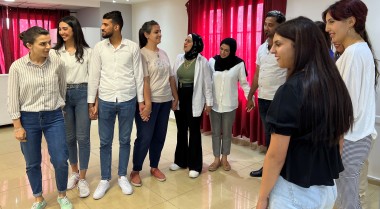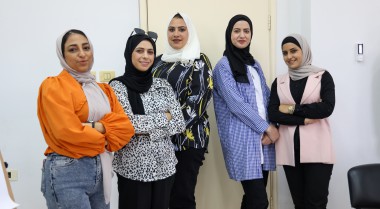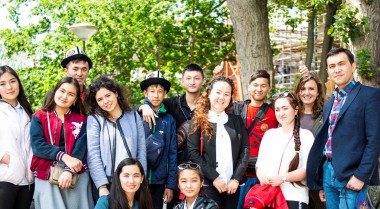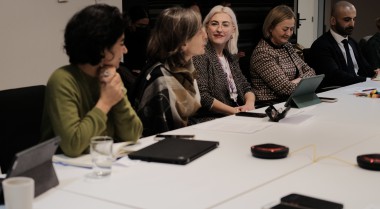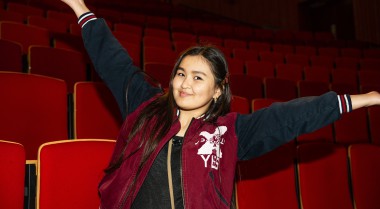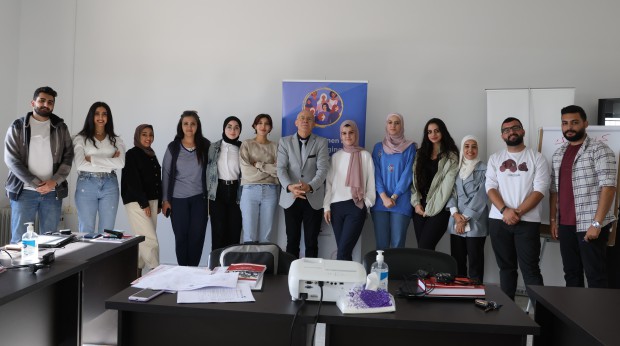
Beyond the headlines: Life in the Occupied Palestinian Territories - A peacebuilder's perspective
We call Lucy, a longstanding local peacebuilder in the Occupied Palestinian Territories (OPT) and founder and executive chair of Middle East Nonviolence and Democracy, a Palestinian organisation based in East Jerusalem, on a rainy Wednesday evening via Zoom. Having recently returned to occupied East Jerusalem from her native England, her long journey through Jordan has left her fatigued. She is visibly relieved to have returned to her family and friends. Lucy is touched by the questions we ask, pauses often before answering and sometimes struggles to find words. Drawing from her extensive 25-year peacebuilding background, Lucy shares insights on life under occupation and elaborates on a shift from militarised security to human security for a chance at peace.
How did you become involved in peacebuilding in Israel/the OPT, and what has motivated you to continue this work for decades?
I became involved very simply because I married a Palestinian who I met as an undergraduate. After completing my studies, I came to teach cultural studies and philosophy in the West Bank. I got to know many young people and engaged in their discussions, making me part of society. When the intifada started in December 1987, which was the first nationwide attempt to shake off the Israeli occupation, and the university was closed by the Israeli government, I needed to become involved and, therefore, after a few years, set up my own organisation to promote, amongst other things, human security, and also appreciation of Palestinian nonviolence, and work towards building a nonviolent future. Living under occupation in East Jerusalem makes you need to do what you can to help. Throughout my years of teaching, there were often military roadblocks set up for a few hours in the morning to make students and faculty run late for class. The Israeli army would periodically raid my student's dormitories and take them as political prisoners. One was always aware of the occupation, but it was much less dangerous then than it has become.
What are your observations of the most recent events and developments in Israel and the OPT?
I do not have the words to describe what is going on. I do not have the words to describe the horrors that are taking place - of people writing numbers on the dead bodies of their children to identify them later on, of people having no food, no water, no shelter. They cannot bake bread because there is no fuel for the ovens. Everything one takes for granted is not there. Even when people were told to go south, they were bombed. The number of casualties just goes up, and it is mainly women and children that get killed. It is unimaginable. The humanitarian agencies cannot get in as it is too dangerous – nowhere is safe. What is particularly horrific is the focus on hospitals. There may be one hospital still partially functioning in the north of the Gaza Strip and a handful in the south, but they are still under attack.
The humanitarian and social consequences are utterly appalling: the starvation, the dehydration, the devastation, the destruction of hospitals, the targeted killing of journalists and healthcare workers, the relentless bombing even of so-called “safe zones” – as the UN has said many times: “nowhere is safe in Gaza”. Palestinians are shot and bombed while attempting to rescue those trapped under the rubble and while burying their many dead. Additionally, there are accounts of summary executions, of bodies being stolen and, if returned, returned without organs, and of (hungry too) stray dogs eating the remains of those that could not be extricated from the destruction.
People in Gaza have no future. They lived in a system of structural violence for decades.
The West Bank is also suffering attacks and killings on a daily basis. Palestinians everywhere are terrified (and with good reason). They are also terrified, especially in Gaza, of being driven out into neighbouring countries and never being allowed to return.
But despite this situation, I am against any violence. I do not justify any violence. I think everyone who is killed should be mourned. Everyone who is wounded should be nursed.
What is the situation like in the West Bank?
Unlike Gaza, the West Bank is not quite so sealed off, but there is a complicated permit structure in place. During the last year, there have been attacks and provocations by the Israeli army and settlers. They are armed to the teeth. Most recently, the government has distributed 10,000 state of the art weapons to the settlers. There is no distinction any more between soldiers and settlers as the military is built around military heroism, and everyone, boys and girls, has to serve in the army. Men stay in the army as reserves.
Keep in mind that Israel, as the occupier, is responsible for the welfare of their occupiers under the Geneva Convention. But Israel has built up this masculine military machine, which includes not only weapons but also vast concrete walls. In Gaza, for instance, they spent billions on building concrete walls not just upwards but also downwards to prevent Hamas from building tunnels. People are literally trapped.
Can you elaborate on what you mean by masculine military security?
Masculine military security is everything defined in terms of military strength and keeping people down so they cannot attack you. The idea of masculine military security is that you ensure your own security by keeping other people without security, meaning you oppress them. But this cannot ever work. If you keep people caged up, people will break out.
What should we focus on instead? What could replace masculine military security?
In my opinion, this is the time to work on human security, which means the freedom from fear, the freedom from want (especially hunger and thirst) , and the freedom to live in dignity. The Palestinian population desperately needs this, as much as possible now and also, of course, in the long term. However, Israelis also need human security rather than military security, as their government has failed them. They do not have freedom from fear, and I am not sure how much dignity they will have after the horrific damage they have done to so many people. To have real, lasting peace, we all need human security.
What is the role of peacebuilders in the current situation? What should be their focus?
People are struggling to look beyond this current catastrophe to try to figure out what a long-lasting and just solution could look like, whether two states or one or something else, and how to get there. Peacebuilding means keeping everyone human in each other's eyes, not allowing dehumanisation in the worst of situations. Peacebuilding means not seeing things in black and white, good and evil. Peacebuilders should listen to other people's pain and have imagination - both about the present and the future.
How do you see the recent events affecting the prospects for reconciliation and peace in the region?
The peace process was totally stuck. Israel was managing the conflict, “shrinking” it, is how they put it. They were just keeping the structural violence in place. They would refer to the bombing attacks on Gaza every few years as “mowing the lawn” - this is the Israeli army terminology for it.
Increasingly, in the past few years, people would say that the idea of a two-state solution (as proposed nearly 50 years ago and which should have been implemented by 1999 via the Oslo Peace Accords) was finished. Unfortunately, these accords were only partially implemented, and that was primarily with regard to Palestinian Israeli military security cooperation.
Now, people are talking about the two-state solution again- in fact, lots of people are saying this is what has to happen on “the day after” which is good. I don’t know how likely it is that it will happen, but the possibility becomes real again. I do not know if you can call whatever comes reconciliation, but just and lasting peace might become more possible. We would, however, need a lot of international intervention to protect people and ensure the implementation of the agreements. It does not work if you have the power asymmetry we currently have without strong and real international guarantees. You need a serious commitment from all parties to any peace agreement, and that commitment needs to be enforced. The problem with the Oslo Accords was (at least partly) that they had the potential to be okay, but no one forced the Israelis to implement their part of the bargain.
What role can the GPPAC network play in supporting peacebuilding efforts in Israel and the OPT?
The support expressed amongst individual members helps. Every kind of communication that raises awareness about the context and reality and keeps Palestinians human feels like support.
With GPPAC colleagues at the Improving Practice Working Group, we are revising the Human Security Manual. We want to bring it up to date and include not just the situation in the Occupied Palestinian Territories but also others, such as Ukraine and Armenia, to ensure it is relevant. We also include climate change and refugees.
I think human security is more useful than the word peace. If you explain it, people can understand what it means, and it conveys the essence of “peace”, which is not just the absence of war but has to include actual freedoms and dignity.
Lucy Nusseibeh, the founder of MEND, has been pioneering awareness about the power of nonviolence within the context of the Israeli-Palestinian conflict and also within the broader regional context.
